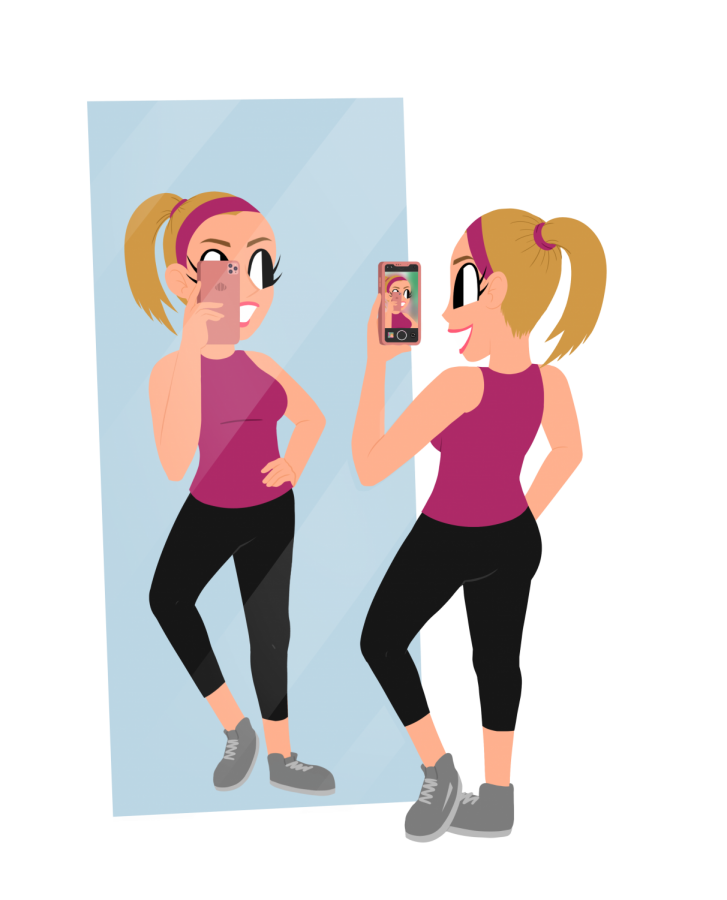Fitness and social media: Getting in shape is easier now than ever before through social media, but how is that affecting people’s self-esteem?
March 3, 2020
In recent years, the hashtag #fitspiration has taken over social media. It has created a subdivision of posts made by already fit people dedicated to displaying their bodies and workout regimes. Posts are typically formatted as videos of people maxing out on their deadlifts, mirror selfies of them in their Gymshark leggings at GoodLife Fitness or photos of their meal plans for the week.
This phenomenon has been growing for years. People no longer have to search for an expensive trainer or buy a home fitness video to get fit, everything they need is right at their fingertips. From YouTube, to Instagram, to countless fitness apps, getting in shape is easier now than ever before. It’s not just about easy access; Information is now democratized. Fitness education isn’t controlled by expensive gyms anymore, and anybody can now access endless information about getting into shape.
While fitness accounts may not have bad intentions, their posts can leave followers feeling worse off than before. According to a 2018 study conducted by Texas State University and the University of Arizona, people who see a lot of workout updates on their feed are more likely to be overly concerned about their weight. More than 40 percent of users indicate that information found on social media affects the way they approach their health.
Those who follow multiple fitness accounts either chose to follow them to get motivated or for inspiration, but social media users need to be more deliberate about who they follow. According to the study, followers that perceive their fitness level to be similar to the people they see will feel worse about their own weight. Perceived similarity can lead to more side by side comparisons about size, fitness and physical ability.
On the other hand, people who saw posts from people they thought were superior to them in terms of fitness level had a positive attitude toward exercise. Seeing someone that is in better shape than you will motivate you to be more like them.
The average social media user likely isn’t consciously aware of which camp they fall into, but social media does have an impact on people’s perspective on their bodies. One of the researchers that conducted the study said that we internalize the things we see without even realizing it and that affects our attitudes about ourselves.
Many students at Lincoln Southeast High School can relate to this phenomenon. It is not uncommon to see friends or classmates posting gym selfies on their Snapchat stories or a Twitter video of them maxing out on their deadlift.
One student that has taken to embracing fitness posting is Jylz Luth (12).
“It’s enveloped my life [and] that’s pretty much all I do,” Luth said. “I want to post to see myself getting better and I hope to maybe even motivate a few people along the way.”
Luth follows somewhere between 20 to 50 fitness accounts on social media and sees fitness posts all the time in his feed. For him, all the posts are motivational because he can see what is possible and achievable.
“If you’re having a bad day or something, you know there’s always something to look forward to,” Luth said.
All of the accounts he follows he perceives to be more fit than himself, saying that a lot of them are like role models or people he aspires to be like. This follows what the college professors found in their research; Luth is motivated by fitness posting on social media because he follows accounts that he perceives to be more fit than himself.
Another student, Sara Pa (12), has taken social media’s many outlets to better her workout regime as well using a fitness app to track her progress.
Pa uses the Gymshark app, a subscription-based mobile app that has a number of ready-to-use programs for various workout frequencies and a workout manager that helps you in creating your fitness routine. She has a meal plan, recorded workouts and weighs herself every three weeks, all through the app.
Along with Luth, Pa believes social media has a positive impact on her self-image.
“When you follow one [fitness page], you can go to the explore page and find even more,” Pa said. “Most of the accounts I follow have workout videos, and [those] pages motivate me and make me [want to] workout like them.”
While fitness posting does have its benefits, there are some negative side effects experienced by some users.
One of those being misinformation — Not all social media accounts are authentic. Naturally, we assume that someone who is fit and seems healthy is an expert on health and wellness, but that is not always the case. Social media contains a multitude of fitness content; Not all of it is going to work for everyone.
Most accounts offering fitness tips should always be taken with a grain of salt. They are not guaranteed to get you the results you are looking for, so it is important to know and understand your level of health before experimenting with crazy keto diets or intense boot camps.
Another con of fitness posting is body image. Although some followers appreciate having a fitness role model, being constantly exposed to people with “perfect bodies” can have serious effects on a person if their self-image is already low. Despite fitness personalities’ good intentions in posting about self-love and body positivity, they turn out to be slightly contradictory in a way. Many celebrities or fitness accounts will post a picture of their abs and perfectly toned bodies with a caption that reads something like, “Never compare yourself to anyone else, especially not me!”
Not all accounts are like this, but there is a substantial amount that lead followers to believe that if they do exactly what their role model does, then they will look like them. Unfortunately, it is not that simple and it is not healthy for some followers.
Although fitness and social media’s relationship has only just begun, it has certainly changed the way we interpret our health and wellness. Today, it is too easy to get swept up on a miracle weight-loss plan that guarantees results within a week, brand new protein powder that slows down your metabolism or a workout plan that has you in the gym for hours every day and night.
Social media can be a great tool in one’s journey to a healthy lifestyle, but only if you fully understand your body and what works for you.









